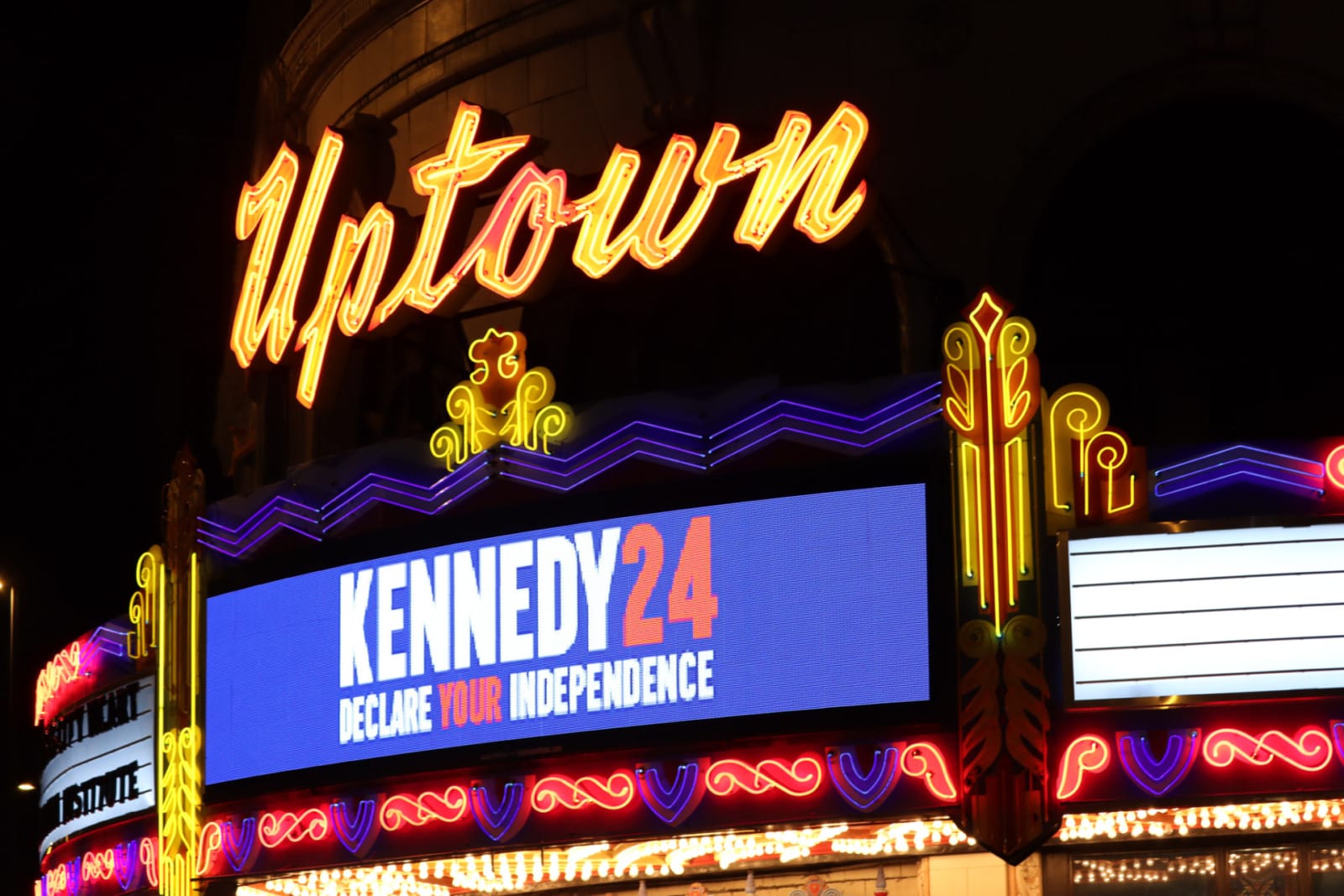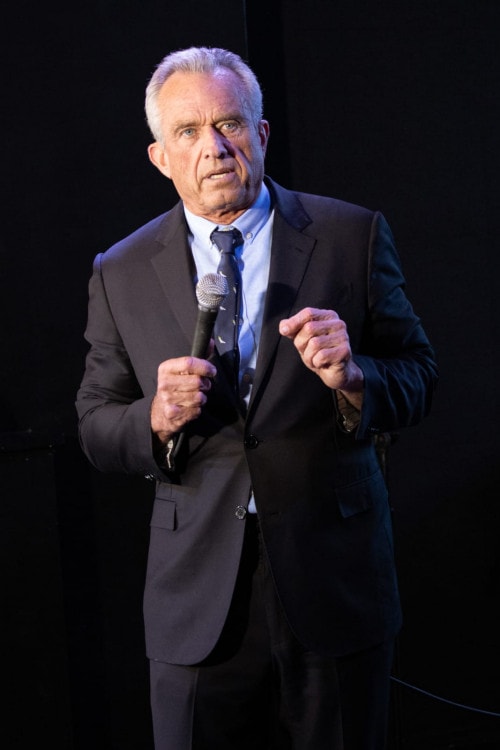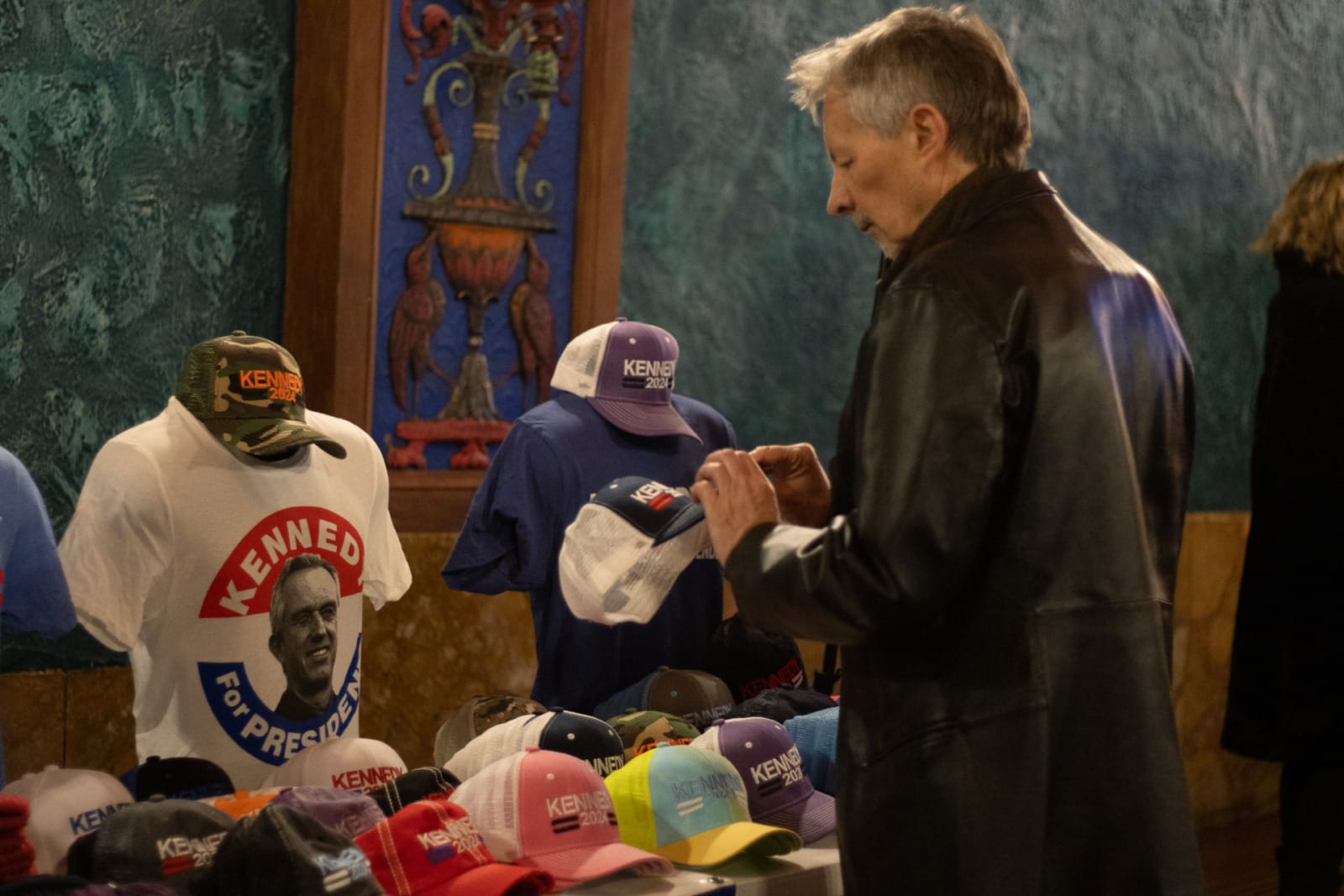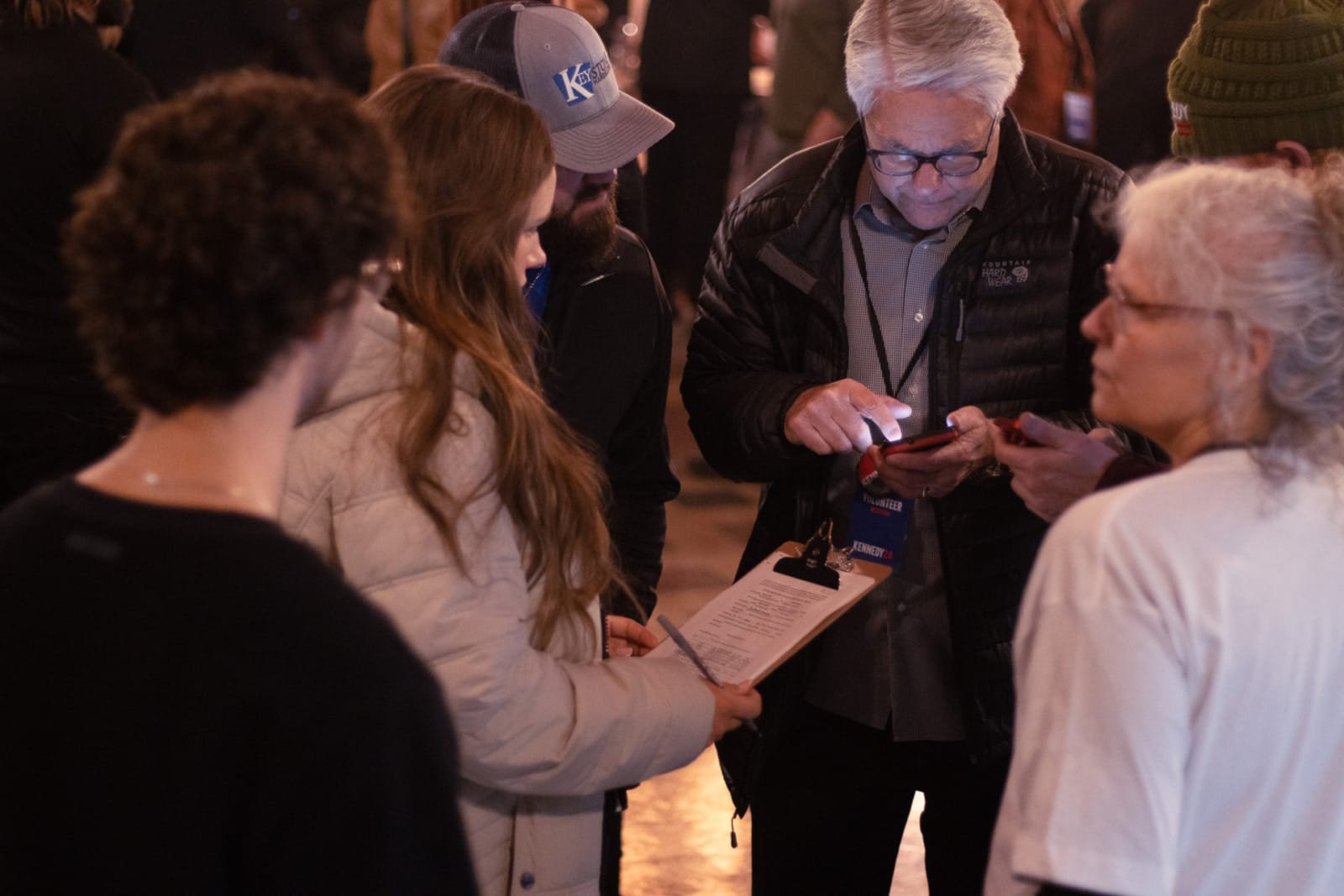Fed Up With Democrats and Republicans? How About an Independent for President? Some Cite Risks for the Country
Published December 20th, 2023 at 6:00 AM
Above image credit: Robert F. Kennedy Jr. stayed after his recent appearance in Kansas City to take photos with attendees. (Cami Koons | Flatland)The political panelists were adamant. The 2024 presidential campaign is too risky. An independent candidate for president could send Donald Trump back into the White House.
Democratic strategist David Axelrod and former chair of the Republican National Committee Michael Steele found plenty of points of divergence during a recent forum in Kansas City.
But on the impact of an independent candidate, both men agreed.
The record of former President Trump underscored their agreement. Trump refused to concede the 2020 election, stoked the Jan. 6, 2021, attack on the U.S. Capitol and is now facing an unprecedented four criminal indictments as he seeks a second term in the White House.
Choosing the nation’s 47th president is pivotal for the republic, Steele and Axelrod emphasized. And the possibility of another Trump administration is dangerous.
An independent candidate would merely slice votes from either Trump or President Joe Biden, the men said.
“These third parties may elect a president in 2024,” Axelrod said. “But it’s not going to be their candidate. It’s going to be either a Republican or a Democrat.”
Steele said that he’s long advocated for expanding the system with a third, a fourth, and even a fifth political party. Just not now.
“I agree with David. This is not the moment in which you want to do that,” Steele said. “You don’t experiment or open up that particular avenue when there is such a danger of falling into something far worse.”
A week later, independent presidential candidate Robert F. Kennedy Jr. drew more than 500 people to the Uptown Theater in Midtown, with many in attendance citing their lack of enthusiasm for Trump, but also Biden.
They’re not alone.

The latest Harvard-Harris poll found a majority of voters (58%) are open to an independent moderate candidate if the 2024 race ends up being a Trump/Biden rematch.
A majority of voters (52%) said they would like to see other candidates join the race with Biden and Trump, according to results of a national Quinnipiac poll released in November.
More than 70% of independents polled wanted to see other candidates in the 2024 presidential race.
But getting a third-party candidate on a state’s ballot is another matter. Signatures are necessary, lots of them.
That is why fervent Kennedy supporters with clipboards greeted people as they arrived at the Uptown on Dec. 13, intent on gathering enough signatures to get Kennedy on the ballot in Missouri.
More Kennedy volunteers also stationed themselves inside the venue, intent on not missing a single opportunity.
More than 200 signatures were gathered that evening, said Stefanie Spear, press secretary for the Kennedy campaign.
In Missouri, Kennedy needs 10,000 signatures from registered voters to be on the ballot. He needs half as many in Kansas.
In a campaign video, Kennedy said his risk in stepping out as an independent candidate was “nothing compared to the risk our founding fathers took when they signed the Declaration of Independence.”
Considered a deeply flawed candidate by some, the positive reception that Kennedy received in Kansas City underscores what some see as America’s growing appetite for independent candidates and third parties.
The latest Harvard-Harris poll with Trump/Biden/Kennedy in a head-to-head competition, shows Trump winning with 44%, Biden with 36% and 20% going to Kennedy.
Axelrod and Steele were featured at American Public Square’s Evening at the Square 2023, a forum held Dec. 4 at the Nelson-Atkins Museum of Art.
Entering the Fray
The Camelot Allure
Admittedly, some in the Uptown crowd were more curious than ardent supporters of Kennedy. One woman said she wasn’t there for politics. Instead, she came to see the ornate interior of the historic nearly 96-year-old theater.
And there’s the weight of the Kennedy name.
To be a Kennedy is often framed by references to Camelot, a shorthand for the family’s rich and tragic role in American politics.
Kennedy, 69, is the son of the late U.S. senator and the nephew of President John F. Kennedy. Both were Democrats and both were assassinated in the 1960s.
His candidacy was denounced as “dangerous to our country” by some of his brothers and sisters shortly after he declared it in October.
In a statement, the four siblings (Kerry and Rory Kennedy, Joseph Kennedy II and Kathleen Kennedy Townsend) said:
“Bobby might share the same name as our father, but he does not share the same values, vision or judgement. Today’s announcement is deeply saddening for us. We denounce his candidacy and believe it to be perilous for our country.”
During his remarks in Kansas City, Kennedy, an environmental attorney, decried the “$8 trillion” that he said the government spent on COVID and yet the nation had high rates of deaths.

Your taxes, he noted, are how it’s all financed. He also decried the cost of wars “in countries that you’ve never heard of.”
“The way they tax us is they do it through a stealth tax called inflation, which hits the middle class, which hits the elderly and people on fixed incomes,” Kennedy said.
Kennedy has questioned vaccines and embraced various conspiracies, attracting widespread criticism.
“We got a big mass experiment on us during 2020-2021 with a medical experiment,” Kennedy said during the Uptown rally, referring to the coronavirus pandemic and vaccines.
But some in the crowd said that Kennedy’s feelings about the COVID vaccine mirrored their own.
Others said they are fed up with the caustic tenor of partisan politics.
Kennedy cited his genteel tone as a strength, saying that he was able to peel people away from both Democrats and Republicans.
“I’m polling from both sides pretty much equally,” Kennedy said.
Asked for examples during a follow-up press conference, Kennedy noted that he aligned with many of the traditional Democrat causes that moved his father and uncle.
Kennedy said that he’d been reluctant to leave the Democratic party, as it was the heritage of his family. But he felt that he had no choice, given the rules, if he wished to be on the ballot.
“The solutions that I’m offering are common sense and they’re not mean spirited,” he said.
Later, he emphasized, “I expect to win.”
Many of his supporters, especially the under-35 audience where he polls highly, coalesced after listening to his interviews with Joe Rogan and Jordan Peterson on popular podcasts.
During the rally, Kennedy encouraged listening to such podcasts.
“If the only thing I watch is MSNBC and CNN and read the New York Times, I would have a very low opinion of myself,” Kennedy said, laughing.
A longform podcast, he argued, won’t censor him to please advertisers.
“Declare Your Independence” is among the candidate’s mottos, stamped on Kennedy24 merchandise.
He also promotes the phrase: “Every American who works hard should be able to afford a good life.”
Independent, or Just Not into Politics?
The mindset of an independent isn’t easily gauged or categorized.
Short interviews with many of the people who attended the Kennedy rally provided examples.
Many people declined to give their full names, with some saying that they didn’t want to draw backlash from employers, or family.
One man had listened to Kennedy the night before in Lincoln, Nebraska, then drove to hear him again in Kansas City.
Disenchantment with the argumentative tenor of Democrats and Republicans was also cited by attendees.
“He just feels middle ground to me,” said Rhodana Harrison, who brought her young daughter to the rally. “The extremes of other candidates is such a turn off.”

A 2019 assessment by PEW Research Center offered some definitions of independents.
“Political Independents; Who They Are, What They Think” noted the independents outnumber both Democrats and Republicans, a fact that makes it seem that by sheer numbers, this group of voters could elect a candidate.
Until one looks further.
Most people who identify as independents, more than 80%, “lean” to one party or the other.
Fewer than 10% of independents lean neither Democrat nor Republican.
True independents stand out for not having an interest at all in politics, PEW emphasized.
“And the small share of Americans who are truly independent — less than 10% of the public has no partisan leaning — stand out for their low level of interest in politics,” the PEW study noted.
The survey was given in 2018. In it, 38% of the public overall described themselves as independents. Meanwhile, 31% said they were Democrats and 26% said they were Republicans.
The party splits haven’t changed much over time, although the proportion of independents is higher than the 2000-2008 period, “when no more than a third of the public identified as independents,” the study said.
That earlier period featured one of the most contested presidential elections in modern history.
The 2000 candidacy of Green Party candidate Ralph Nader, it could be argued, prevented former Vice President Al Gore from becoming president over former Texas Gov. George W. Bush.
A month after that election, it was determined that fewer than 600 votes separated Gore from Bush in Florida.
Ultimately, the U.S. Supreme Court ruled, overturning a state decision. There were manual recounts and arguments about how to determine votes with “hanging chads,” the bits of paper from ballots where voters punch out their choices, and disputes about the intent of election laws set in place by the Florida legislature.
By winning Florida’s 25 electoral votes, Bush achieved the electoral votes necessary, 271, to defeat Gore, who won 266.
The 2000 presidential election is often cited by those assessing the impact of independents. Nader, a longtime consumer advocate, ran as the Green party candidate, appearing on the ballot in 43 states and the District of Columbia.
Nader won more than 97,000 votes in Florida, clearly enough to push Gore into presidency, if those votes had gone to the vice president.
Besides Nader, there also was the impact of a fourth choice on the Florida ballot, conservative candidate Pat Buchanan, who ran as a Reform party candidate.
Votes cast for Buchanan became an issue in Palm Beach, where a “butterfly ballot” was used. As many as 3,400 votes were cast for Buchanan in error, it was argued, when people became confused, believing that they had voted for Gore.
Nader disputes his label as a spoiler, saying that he merely wanted to reach the 5% threshold of voters necessary for his party to receive matching funds in future elections.
Nader won 2.7 % of the 2000 popular vote, but no electoral votes.
In subsequent years, he’s continued to promote a populist view, decrying the nation’s “two-party duopoly.”
Independent Voices
In recent years, many organizations have taken up the mantle of independent candidates, third parties and other reforms.
The centrist group No Labels is among the best known.
The group, established in 2009, says it is “intellectually open, about solutions, and spry and indefatigable.”
No Labels is trying to get on the ballot in all 50 states and the District of Columbia to promote an independent Unity Ticket for 2024, if the American public is supportive.
The complications of achieving that goal are well known to Greg Orman, who many in the Kansas City area will recall from his candidacies in Kansas for a U.S. Senate seat and governor.
Orman, a board member with American Public Square, lost to incumbent Sen. Pat Roberts, a Republican, in 2014, and to Gov. Laura Kelly, a Democrat, in 2018.
Orman continues to write on political issues, often for Real Clear Politics.
He recently recounted the cumbersome and costly process to get on the ballot, noting recent successes of No Labels.
“The No Labels ballot access milestone is yet another reminder of how desperate the American electorate is to have any alternative to the projected Trump/Biden rematch,” Orman wrote.
Kennedy has called ballot access laws for independents and third-party candidates a form of voter suppression.

Orman frames the issue as a lack of competition in politics.
“The rules are now so complicated that it takes teams of lawyers to decipher them,” Orman wrote in an August article. “Assuming everything goes well, the cost of gathering the signatures required to gain ballot access as a presidential candidate is now estimated to be between $50-$75 million. Is it any wonder that the only credible presidential challenge to the duopoly in the last hundred years was billionaire Ross Perot?”
Steele, who is also a former Lt. Gov. of Maryland, said that he’s been in conversations with the leaders of such efforts, citing the Forward Party and No Labels.
He said he grills organizers with one simple question: “Tell me what state you win?”
“If you can tell me that state you take electoral votes from Donald Trump or Joe Biden then you may be in the game,” he recounted.
But until then, an independent candidate will simply pull votes from either of the leading candidates, possibly pushing Trump back into the White House.
Axelrod said that he believes Trump would welcome a third-party candidate for that reason.
“You see it in the polling,” he said. “It’s marginal, but Trump does a point or two better when third parties are introduced.”
The Electoral College, PEW notes, consistently produces more “lop-sided” results than the popular vote.
“So maybe someday there will be a third-party option that would be a receptacle for people who feel alienated from both parties,” Axelrod said. “That could bring about real change. I don’t think that’s the solution for 2024.”
Mary Sanchez is senior reporter for Kansas City PBS.
Cami Koons covers rural affairs for Kansas City PBS in cooperation with Report for America. The work of our Report for America corps members is made possible, in part, through the generous support of the Ewing Marion Kauffman Foundation.




I am disappointed that this article included no mention of open primaries and ranked choice voting. These political innovations offer a viable solution to the current political duopoly and having to choose between the lesser of two evils.